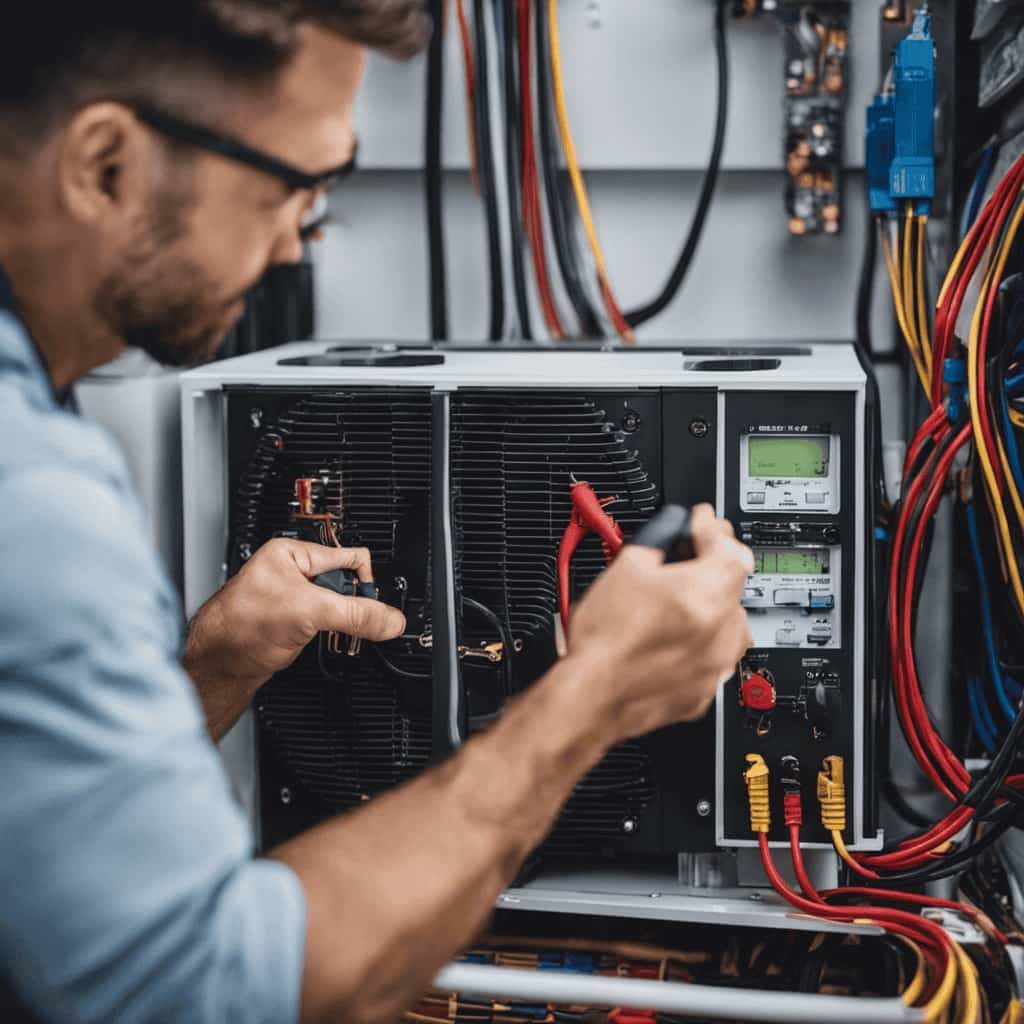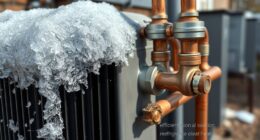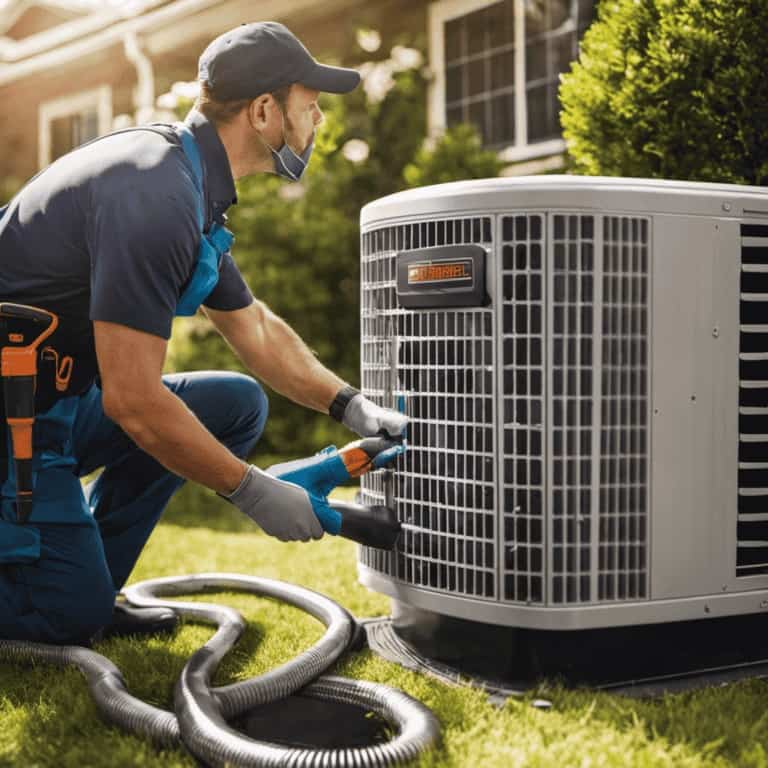
Get ready to get rid of guilt and upgrade your home heating system! We have discovered the cutting-edge solution you have been looking for: eco-friendly heat pumps.
These innovative devices are taking the world by storm, offering a renewable energy solution that will not only keep your home cozy, but also reduce your carbon footprint. Say goodbye to traditional heating systems and hello to energy efficiency and cost savings.
Join us on this exciting journey as we explore the future of home heating with heat pump innovations.
Key Takeaways
- Heat pumps offer cost-effective energy savings and lower utility bills.
- Heat pumps reduce carbon emissions and reliance on fossil fuels.
- Regular maintenance is crucial for optimal performance and energy savings.
- Advanced features and technology, such as smart integration and enhanced heat exchangers, further improve the efficiency and environmental friendliness of heat pumps.
The Environmental Impact of Heat Pumps
We’ll explore three significant environmental benefits of heat pumps.
Heat pumps are a game-changer when it comes to renewable energy sources and environmental sustainability.
First and foremost, heat pumps are incredibly energy-efficient. Unlike traditional heating systems that rely on burning fossil fuels, heat pumps use electricity to transfer heat from the air or ground to warm your home. This means they consume less energy and produce fewer greenhouse gas emissions, reducing your carbon footprint.
Secondly, heat pumps can also act as air conditioners, providing cooling in the summer months without the need for separate cooling systems. This dual functionality increases energy efficiency and reduces overall energy consumption.
Lastly, heat pumps can be powered by renewable energy sources such as solar or wind power, further promoting environmental sustainability.

With these environmental benefits, heat pumps are paving the way for a greener future.
How Heat Pumps Work: A Renewable Energy Solution
Using a heat pump is a sustainable solution for renewable energy, efficiently transferring heat from the air or ground to warm our homes. Heat pumps work by utilizing the principles of thermodynamics and the properties of refrigerants to extract heat energy from one source and transfer it to another.
Here’s how they work:
-
Evaporation: The heat pump’s refrigerant evaporates at a low temperature, absorbing heat from the air or ground.

-
Compression: The evaporated refrigerant is then compressed, increasing its temperature and pressure.
-
Condensation: The hot, pressurized refrigerant condenses, releasing heat energy that’s transferred to the home’s heating system.
-
Expansion: Finally, the refrigerant expands and returns to its initial state, ready to repeat the cycle.
By harnessing renewable energy sources, heat pumps reduce our reliance on fossil fuels and provide sustainability benefits.
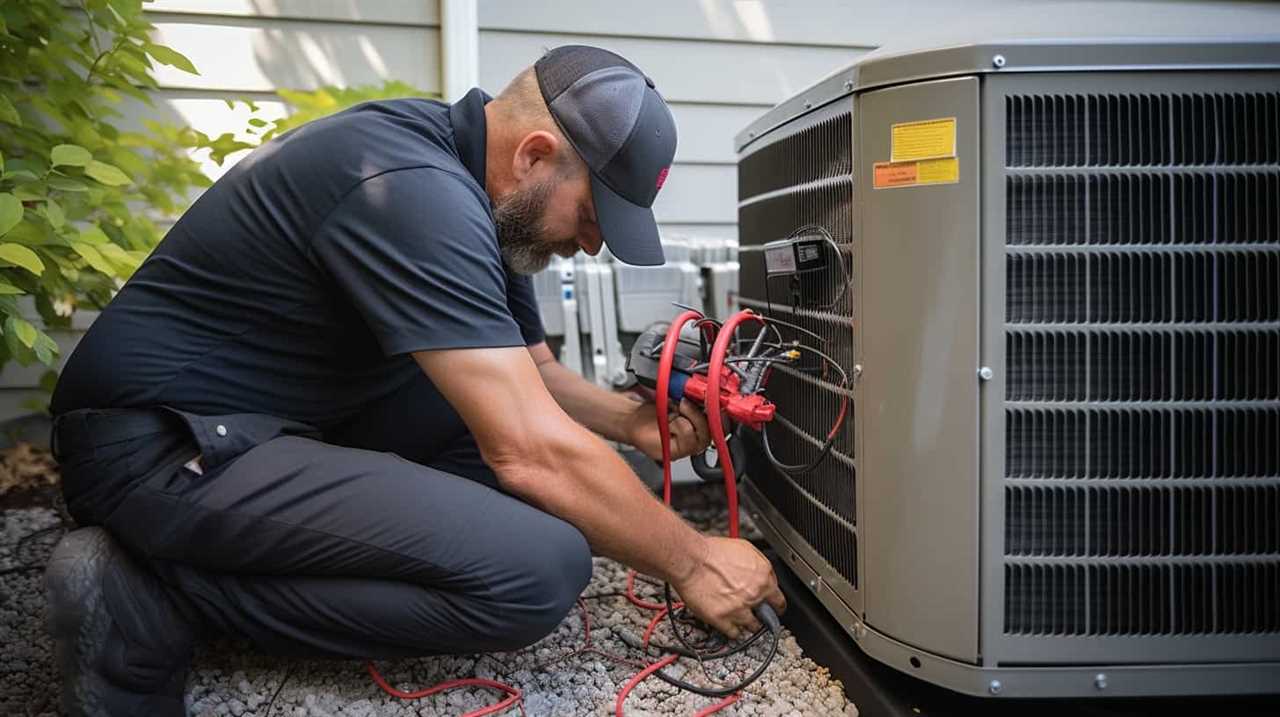
Now, let’s explore the many benefits of heat pumps for home heating.
Benefits of Heat Pumps for Home Heating
When it comes to home heating, heat pumps offer a range of benefits that make them an attractive option for homeowners.
Firstly, they provide cost-effective energy savings by efficiently converting electricity into heat. This not only reduces utility bills but also helps to lower carbon emissions, making heat pumps an eco-friendly choice.
Additionally, heat pumps offer versatile heating options, including the ability to cool your home in the summer months.
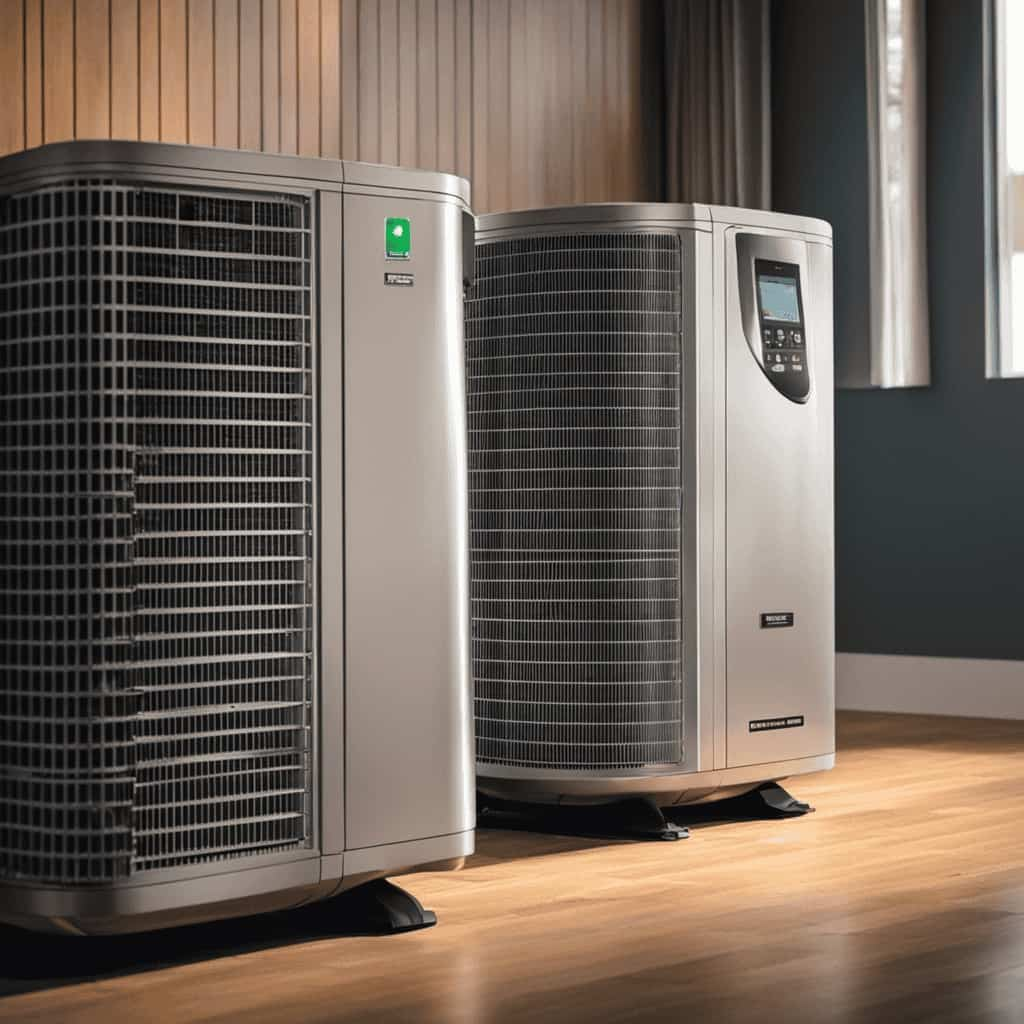
Cost-Effective Energy Savings
With heat pumps, we can save money on energy costs by efficiently heating our homes. Here are some energy-saving benefits and long-term savings that heat pumps offer:
-
Reduced energy consumption: Heat pumps use less energy compared to traditional heating systems, resulting in lower utility bills.
-
Renewable energy source: Heat pumps utilize renewable energy from the air, ground, or water, reducing reliance on fossil fuels and promoting sustainability.
-
Lower maintenance costs: Heat pumps have fewer moving parts and require less maintenance compared to conventional heating systems, leading to long-term savings.

-
Government incentives: Many governments offer incentives, such as tax credits and rebates, for installing energy-efficient heat pumps, further reducing the initial investment and increasing savings over time.
Reduced Carbon Emissions
For a greener home heating solution, heat pumps can significantly reduce carbon emissions and help us minimize our environmental impact.
Heat pumps are a sustainable heating option that utilize renewable energy sources to provide warmth for our homes.
Unlike traditional heating systems that rely on fossil fuels, heat pumps extract heat from the air, ground, or water, and transfer it into our homes.

This process requires minimal energy input, resulting in reduced carbon emissions compared to conventional heating methods.
By using heat pumps, we can decrease our reliance on non-renewable resources and contribute to a more sustainable future.
Additionally, heat pumps are highly efficient, making them an innovative and environmentally friendly choice for home heating.
Versatile Heating Options
Because heat pumps can provide both heating and cooling, they offer versatile heating options for our homes. Here are four benefits of heat pumps as energy efficient alternatives and sustainable heating solutions:

-
Year-round comfort: Heat pumps have the ability to both heat and cool our homes, providing comfort throughout the year. Whether it’s a chilly winter day or a hot summer afternoon, heat pumps can maintain a pleasant indoor temperature.
-
Lower energy consumption: Heat pumps transfer heat from the air or ground, rather than generating it from scratch. This makes them incredibly energy efficient, resulting in lower energy bills and reduced environmental impact.
-
Improved indoor air quality: Heat pumps have built-in air filters that help remove dust, allergens, and other pollutants from the air, creating a healthier living environment for us and our families.
-
Reduced carbon footprint: By using heat pumps for home heating, we can significantly reduce our carbon emissions. Heat pumps operate on electricity, and when powered by renewable energy sources, they become an even more sustainable choice.
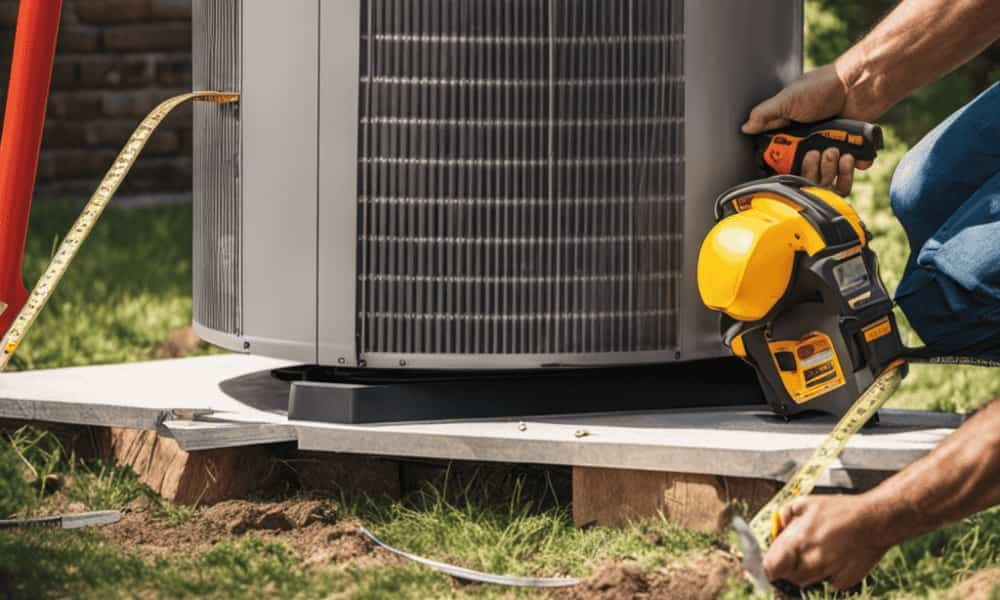
With their ability to both heat and cool, energy efficiency, improved air quality, and reduced carbon footprint, heat pumps offer versatile heating options that are both environmentally friendly and innovative.
Energy Efficiency: Heat Pumps Vs. Traditional Heating Systems
When it comes to energy efficiency, heat pumps have several advantages over traditional heating systems.
Heat pumps are able to extract heat from the air, ground, or water, making them highly efficient.
In contrast, traditional systems like furnaces and boilers rely on burning fuel, which can result in energy loss.

Understanding the energy efficiency comparison between heat pumps and traditional heating systems is crucial in making informed decisions about home heating.
Heat Pump Advantages
We found that heat pumps offer significant advantages in energy efficiency compared to traditional heating systems. Here are four reasons why:
-
Lower energy consumption: Heat pumps use electricity to transfer heat from the outside air or ground into your home, resulting in less energy usage compared to traditional heating systems that generate heat through combustion.
-
Reduced carbon footprint: By relying on renewable energy sources like the sun and the earth’s heat, heat pumps contribute to a greener future by reducing greenhouse gas emissions.
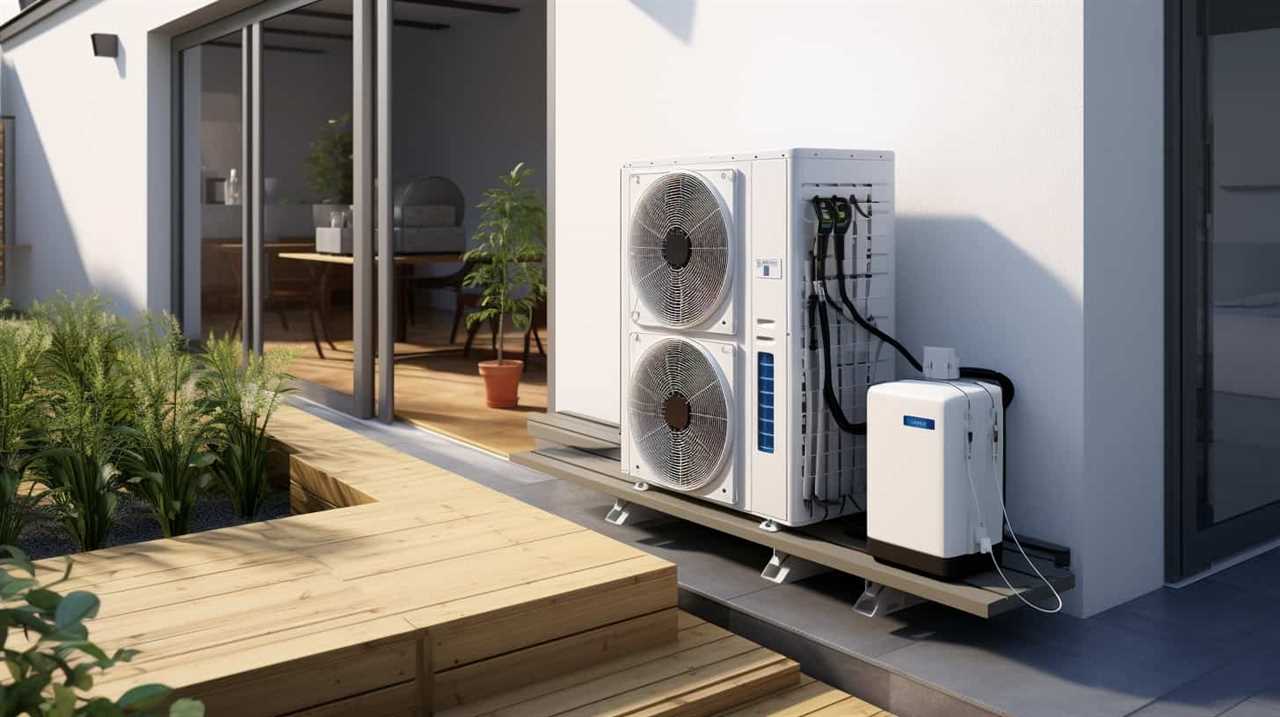
-
Cost savings: With their higher energy efficiency, heat pumps can help lower your energy bills, saving you money in the long run.
-
Low maintenance requirements: Heat pumps generally require less maintenance compared to traditional heating systems. Routine inspections and filter changes are usually sufficient to keep them running smoothly.
These advantages make heat pumps an innovative and eco-friendly choice for home heating. However, it’s important to consider the drawbacks of traditional heating systems as well.
Traditional Systems Drawbacks
Three major drawbacks of traditional heating systems are their lower energy efficiency, higher carbon emissions, and increased operating costs.

Traditional systems, such as furnaces and boilers, are known for their inefficiency in converting fuel into heat. This results in a significant amount of wasted energy, which not only impacts the environment but also increases utility bills.
Additionally, traditional heating systems rely on fossil fuels, leading to higher carbon emissions and contributing to climate change.
The operating costs of these systems can be burdensome, as they require regular maintenance and fuel replenishment.
As alternatives to traditional heating systems, eco-friendly heat pumps offer higher energy efficiency, lower carbon emissions, and reduced operating costs.
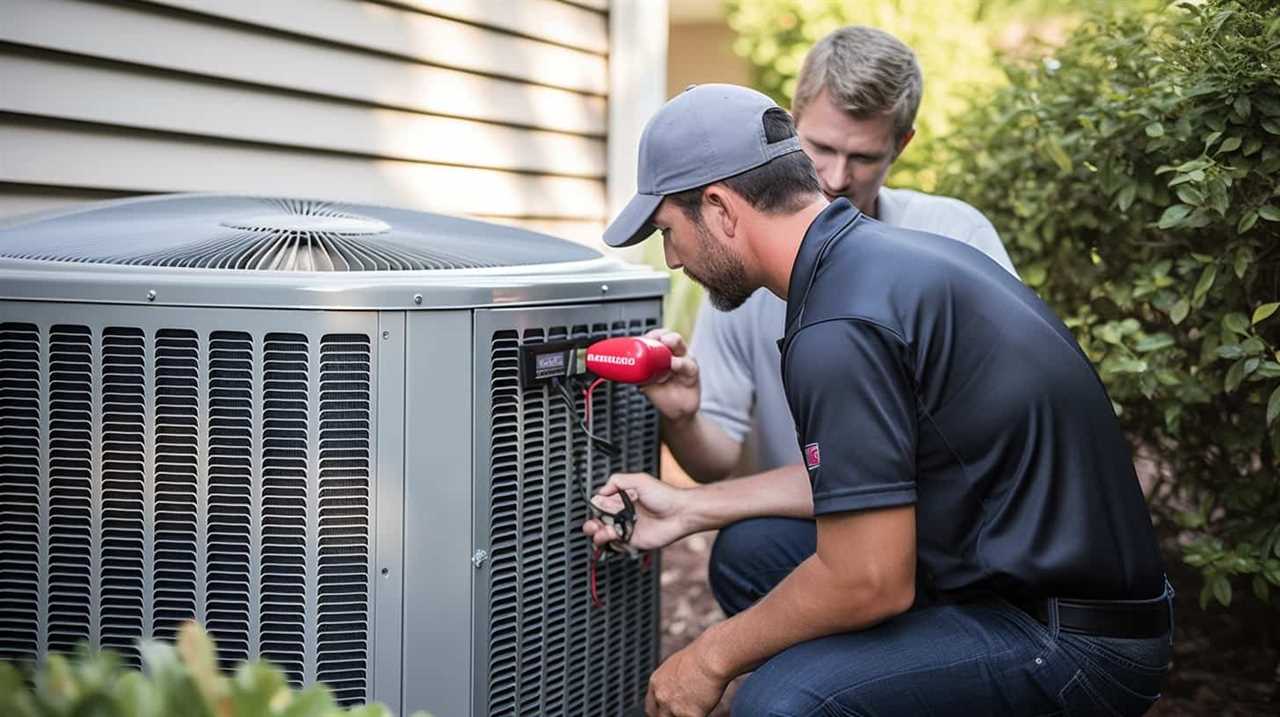
Energy Efficiency Comparison
For our comparison of energy efficiency, heat pumps are more efficient than traditional heating systems. This means that heat pumps consume less energy to produce the same amount of heat, resulting in significant energy savings for homeowners.
Here are four reasons why heat pumps are more energy-efficient:
- Heat pumps transfer heat from the air or ground, rather than generating heat, which reduces energy consumption.
- Heat pumps can provide both heating and cooling, eliminating the need for separate systems and reducing overall energy usage.
- Heat pumps utilize advanced technology, such as variable-speed compressors, to optimize energy efficiency by adjusting output based on demand.
- Heat pumps can achieve high efficiency ratings, such as SEER (Seasonal Energy Efficiency Ratio) and HSPF (Heating Seasonal Performance Factor), resulting in lower energy bills and reduced environmental impact.
Cost Savings With Eco-Friendly Heat Pumps
One of the biggest benefits of eco-friendly heat pumps is their ability to save homeowners money on their heating bills. By using energy efficient technology, these heat pumps provide an environmentally sustainable solution for home heating while also reducing energy costs.
| Energy Savings | Cost Savings | Environmental Impact |
|---|---|---|
| Up to 50% | Significant | Lower carbon footprint |
| Reduced energy consumption | Long-term savings | Decreased reliance on fossil fuels |
| Lower utility bills | Return on investment | Conservation of natural resources |
| Enhanced energy efficiency | Reduced maintenance costs | Preservation of the environment |
| Improved indoor air quality | Increased home value | Contribution to a sustainable future |
As seen in the table above, eco-friendly heat pumps offer a range of benefits that go beyond just saving money. These heat pumps not only help homeowners reduce their carbon footprint but also provide long-term savings and contribute to the preservation of the environment. Additionally, the improved energy efficiency and indoor air quality enhance the overall comfort and value of the home. With eco-friendly heat pumps, homeowners can enjoy cost savings while making a positive impact on the planet.

Heat Pumps and Reduced Carbon Footprint
Our eco-friendly heat pumps significantly reduce our carbon footprint while providing efficient home heating. By utilizing renewable heating solutions, these heat pumps contribute to sustainable heating options and help combat climate change.
Here are four reasons why heat pumps are an excellent choice for reducing carbon emissions:
-
Energy Efficiency: Heat pumps operate by transferring heat from one area to another, rather than generating heat from fossil fuels. This energy-efficient process reduces the amount of electricity needed for heating, resulting in lower carbon emissions.
-
Reduced Fossil Fuel Consumption: Traditional heating systems rely on burning fossil fuels, which release greenhouse gases into the atmosphere. Heat pumps, on the other hand, use electricity to transfer heat, eliminating the need for fossil fuel consumption.
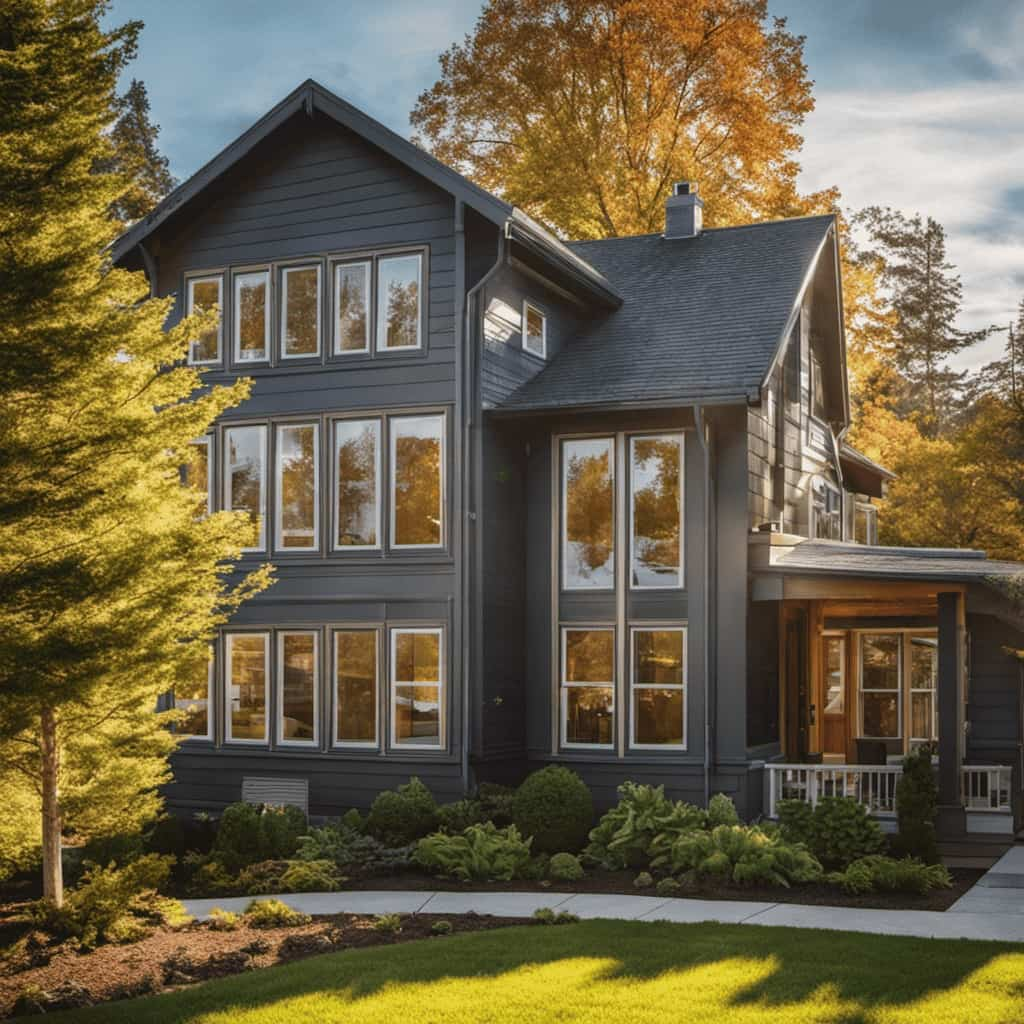
-
Renewable Energy Integration: Heat pumps can be powered by renewable energy sources, such as solar or wind power. By integrating heat pumps with renewable energy systems, homeowners can further decrease their carbon footprint.
-
Long-Term Environmental Impact: Adopting heat pumps as a sustainable heating option not only reduces immediate carbon emissions but also contributes to long-term environmental preservation. By choosing renewable heating solutions, we can actively participate in creating a greener future.
Choosing the Right Heat Pump for Your Home
When considering heat pumps, we must carefully select the right one for our homes. Heat pump installation is a crucial step in ensuring efficient and effective heating for our households.
One important factor to consider is the size of the heat pump. A unit that’s too small will struggle to adequately heat our homes, while a unit that’s too large will lead to excessive energy consumption.

It’s also essential to choose a reputable brand that offers high-quality products and reliable customer support. Additionally, regular maintenance is key to keeping our heat pumps running smoothly. Simple maintenance tips, like regularly cleaning or replacing filters, can greatly improve efficiency and prolong the lifespan of the unit.
The Future of Home Heating: Heat Pump Innovations
We are witnessing several exciting innovations in heat pump technology that will shape the future of home heating. These future advancements not only promise greater efficiency and cost savings, but also have a significant impact on climate change.
Here are four key innovations to look out for:
-
Smart Technology Integration: Heat pumps will become increasingly connected, allowing homeowners to monitor and control their systems remotely. This will optimize energy usage and reduce wastage.
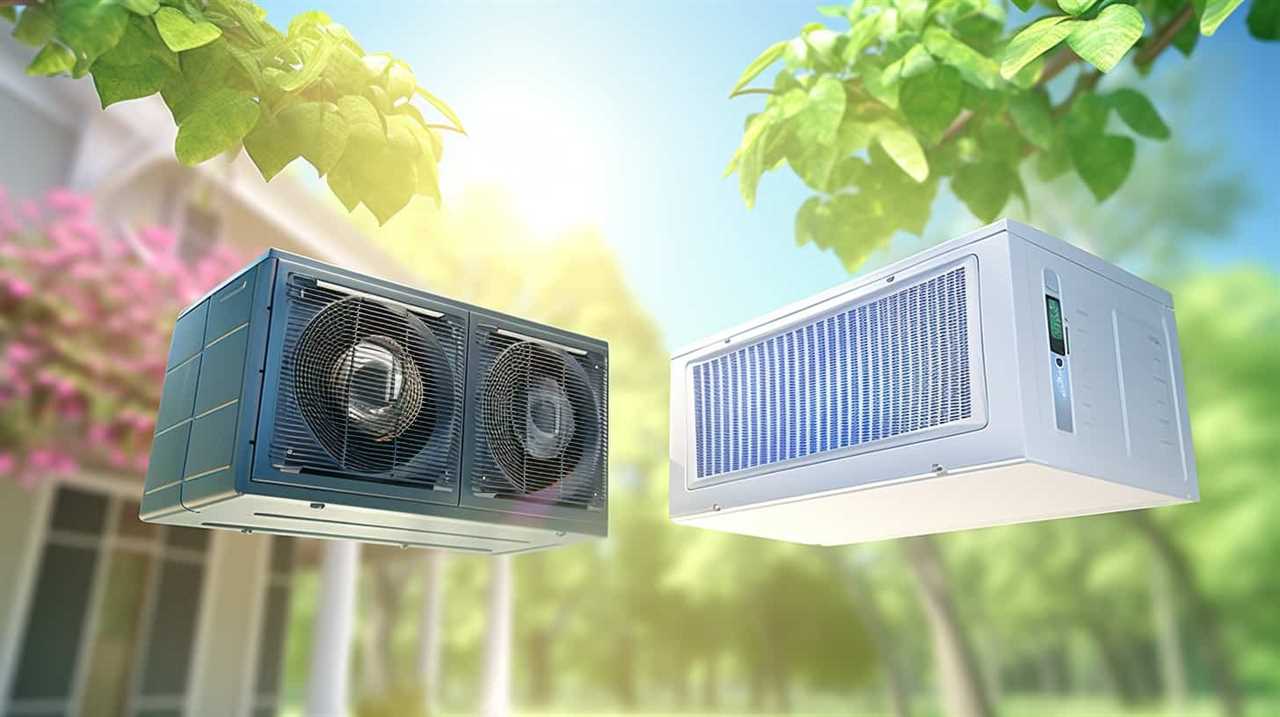
-
Renewable Energy Integration: Heat pumps will be designed to seamlessly integrate with renewable energy sources such as solar panels and wind turbines. This will further reduce carbon emissions and reliance on fossil fuels.
-
Advanced Heat Exchangers: Improved heat exchanger designs will enhance the efficiency and performance of heat pumps, making them even more environmentally friendly.
-
Hybrid Systems: Hybrid heat pump systems that combine traditional heating methods with heat pump technology will become more prevalent, providing increased flexibility and energy savings.
These innovations hold great promise for a greener and more sustainable future in home heating, helping us combat climate change while keeping our homes warm and comfortable.
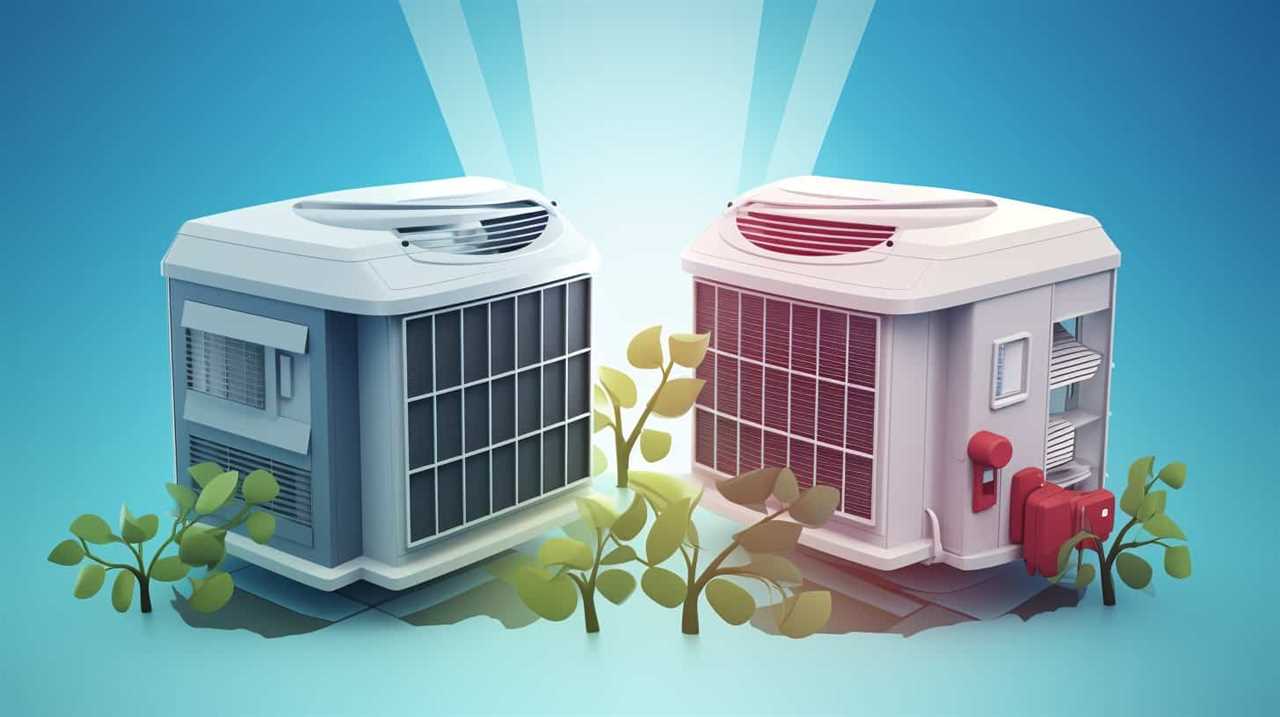
Frequently Asked Questions
Can Heat Pumps Be Used in Older Homes With Existing Heating Systems?
Yes, heat pumps can be used in older homes with existing heating systems. There are retrofitting options available to ensure heat pump compatibility, making it easier for homeowners to transition to more eco-friendly and efficient heating solutions.
Are Heat Pumps Suitable for All Climates?
Heat pumps are suitable for all climates due to their high efficiency. Although installation costs vary, the long-term energy savings make them a viable option. Heat pumps revolutionize home heating by providing eco-friendly and cost-effective solutions.
How Long Do Heat Pumps Typically Last?
Heat pumps typically last around 15-20 years, depending on usage and maintenance. Regular inspections and proper care can help extend their lifespan. Investing in newer, more efficient models can also increase average heat pump longevity.
Do Heat Pumps Require Regular Maintenance?
Yes, heat pumps do require regular maintenance to ensure optimal performance and efficiency. Regular maintenance helps to identify and address any potential issues, maximizing the benefits of heat pumps in terms of energy savings and environmental impact.
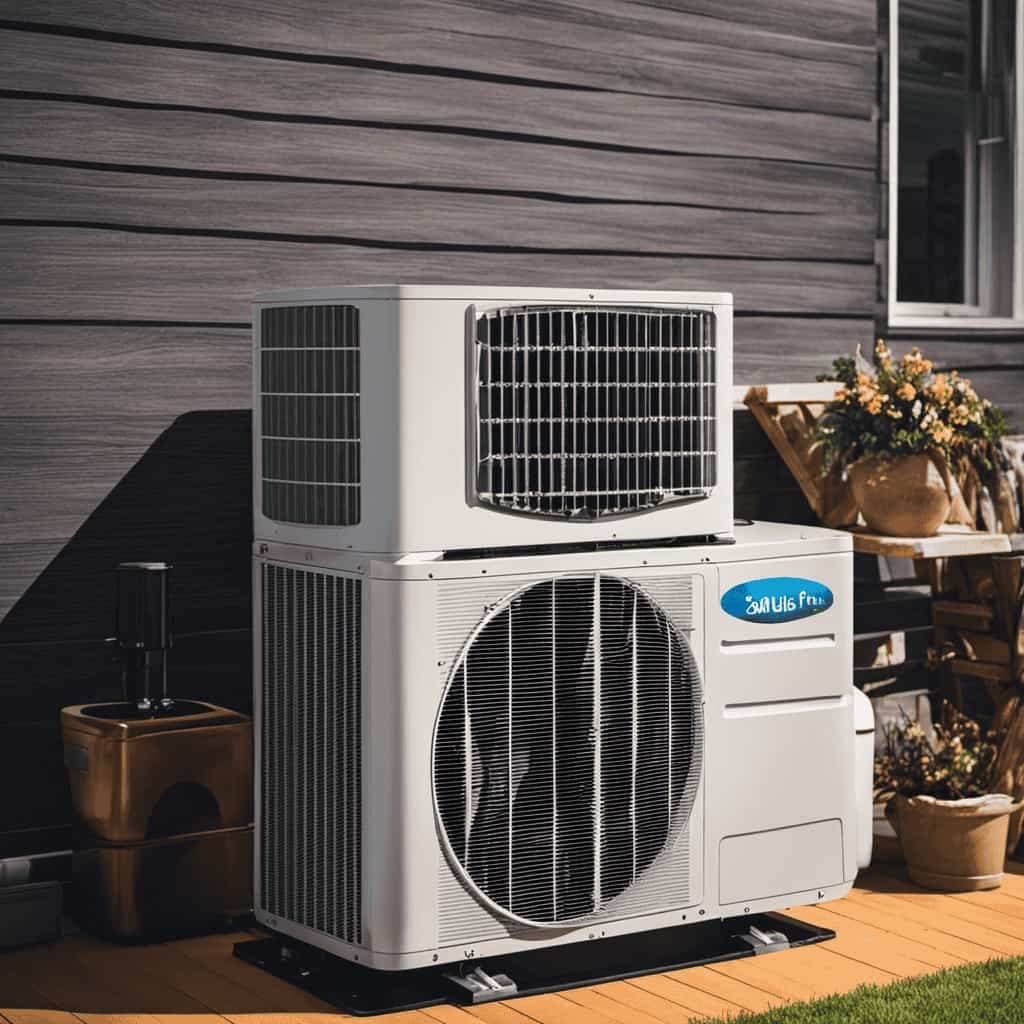
How Noisy Are Heat Pumps Compared to Traditional Heating Systems?
Are heat pumps noisy? Compared to traditional heating systems, heat pumps are surprisingly quiet. The low noise levels of heat pumps contribute to a more comfortable home environment, allowing you to enjoy eco-friendly heating without any disturbance.
Conclusion
In conclusion, eco-friendly heat pumps offer a renewable energy solution for home heating, providing numerous benefits such as energy efficiency and cost savings.
By reducing our reliance on traditional heating systems, heat pumps help us reduce our carbon footprint and contribute to a more sustainable future.
As the future of home heating, heat pump innovations continue to revolutionize the way we stay warm while protecting the environment.

Remember, ‘A stitch in time saves nine,’ so let’s embrace this eco-friendly technology and banish guilt from our heating choices.



